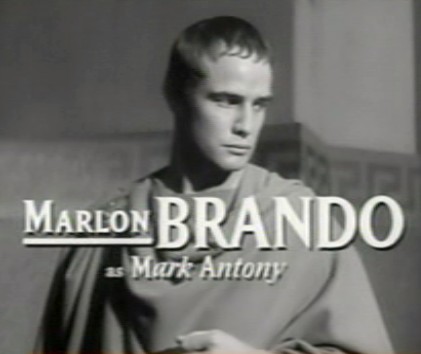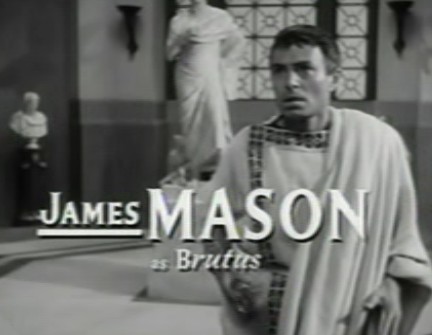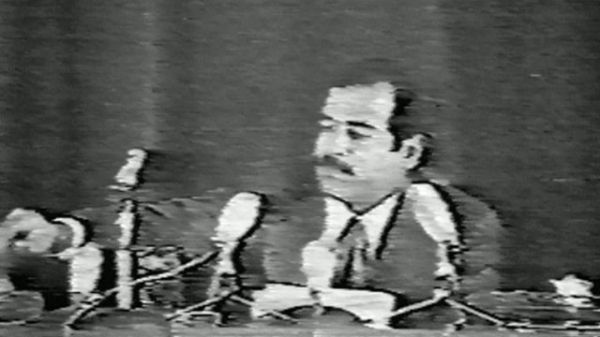Democracy—So Many Unknowns
The Wisdom of Julius Caesar
I took a public-speaking class in high school. For one assignment, each student had to declaim from a published speech. I don't remember how I made my selection. I did a speech from the play Julius Caesar by William Shakespeare. After the assassination of Caesar, Marc Antony eulogizes him before the Roman people, in Act III, Scene ii: "Friends, Romans, Countrymen! Lend me your ears. I come to bury Caesar, not to praise him. . . ."
It was only a school assignment, one of hundreds. Later in college, however, I had to revisit Julius Caesar in depth, in the context of a Shakespeare course. I remember it as an interesting experience. There were only about 8 people in the class, so we sat at a conference table. Our professor spoke like a Tennessee hillbilly, in the same tone of voice he might use to describe a haircut. He had comfortably intimate knowledge of Julius Caesar and called our attention to all the dramatic and ironic undertones in the text.
First of all, Julius Caesar ranks at the very top of the list of world conquerers—a man obsessed with conquest, murder, and war-booty, including the human kind. His men occasionally dragged a conquered chieftain back to Rome, led him into the infamous Colloseum, and strangled him before crowds of spectators. Caesar pioneered ethnic- cleansing—murdering 40,000 citizens in Avericum (today Bourges, France).
A conspiracy developed among the Roman elite. The conspirators decided they had to take out Caesar, who was becoming a tyrant. After they carried out the deed, Marcus Brutus addressed the Roman populace to explain why he had to do this terrible deed:
"If there be any in this assembly, any dear friend of Caesar's, to him I say that
Brutus's love to Caesar was no less than his. . . . As Caesar loved me, I weep for
him; as he was fortunate, I rejoice at it . . . as he was ambitious, I slew him. . . .
"With this, I depart," Brutus continues, "that, as I slew my best lover for the good
of Rome, I have the same dagger for myself, when it shall please my country to
need my death."
His speech moves the Romans to cheer him: "Live, Brutus! Live! Live! . . . Bring him with triumph home unto his house! . . . Give him a statue with his ancestors! . . . Let him be Caesar! . . . Caesar's better parts shall be crowned in Brutus!"
Brutus, an incurably innocent man with reasoned, honorable intentions driven only by a sense of loyalty to Rome, is no match for the scheming rabble-rouser Marc Antony. Antony knows the Romans. He knows how do drive them, manipulate them, and turn them 180 degrees in their tracks. He can weep the necessary crocodile-tears and turn the Romans against Brutus, whom they have only just now hailed as a hero.
I remember the thrill I felt at reciting Marc Antony's speech, that concludes with the lines, "You all did love him once, not without cause. What cause withholds you then to mourn for him? O judgement! Thou art fled to brutish beasts (presumably Brutus and the other conspirators), and men have lost their reason. Bear with me. My heart is in the coffin there with Caesar, and I must pause till it come back to me!"
One Roman responds, "Methinks there is much reason in his sayings."
A second citizen agrees, "If thou consider rightly of the matter, Caesar has had a great wrong."
A third citizen takes note of Marc Antony, "Poor soul! His eyes are red as fire with weeping."
Yet another citizen sums up the opinions of the others: "There's not a nobler man in Rome than Antony."
This many years later, I can still remember the professor chortling over the Romans' changing their minds: "Shakespeare was no Democrat!" I think of the times in history that manipulative hucksters have turned a crowd on its head with bogus tears and outpourings of grief. Antony's ability to work up a fickle public should give us cause to pause—how the Democrat clamoring for more democracy has a significant downside.
The Psychology of Followers
The human puzzle contains thousands of tiny pieces. Every generation may feel it has to spill all the pieces on the floor and reassemble them, but it's a daunting task. Most of the wisdom about human kind has been an open secret for a thousand years anyway; so our own labor over the human puzzle is mostly unnecessary. The modern human animal is, after all, thousands of years old. We already know most of what there is to know about him, if we would just pay attention to it.
Alone, we exist in a kind of vacuum. We need others—significant others, best friends, people you can relax around, people who feel about things as we do, and so on. Starting in childhood, we are attracted to gangs and peer groups. Every group has a leader and some followers. We gain a sense of identity from gangs. They shelter us, so to speak, as we mature—into adolescence, into college, into the workplace. We stay with them till we don't need them any more, or we find another group that suits us better. I've been a member of a group, or clique, and I have felt alone against the wrath of the whole world. Belonging to a group is healthier. You look out for your home-boys; they look out for you.
Sometimes, as in the assassination of Julius Caesar, the associations lead to death at the hands of trusted companions. Thanks to Shakespeare, the story adds hundreds of pieces to the human puzzle. Killing a home-boy is a hell of a thing. Not only does Julius Caesar die, but most of the people who assisted in his death also die. It's pretty traumatic for any group. Most people retain at least a speck of humanity, so it's gotta hurt to kill someone.
Consider the following scene from the movie The Untouchables, starring Kevin Costner and Robert de Niro. Alphone Capone (de Niro) assembles the executives of his criminal empire, seats them around a banquet table, and feeds them drinks and cigars. They all guffaw ingratiatingly as Capone struts around the table and talks distractedly about baseball, holding a bat. Suddenly, his face becomes a mask of kinetic fury, and he smashes one of his guests in the head with the bat. He beats the guy to death, while blood spreads over the white tablecloth—one of his own guys! Like an angry god. It enthralls and terrifies his crew.
Human relationships make history happen, and they are more varied than we would ever believe. The guys in Capone's empire had childhoods, once upon a time. They were little and vulnerable and had moms and dads. So what went wrong? How did they veer off-course? How could they end up kowtowing to a creep like Capone? As he beat the dead man with the bat, blood must have sprayed on all of them.
During an event known today as "Night of the Long Knives," Adolf Hitler and his henchmen from the Gestapo murdered a large number of people. Not Jews or Communists, but other Nazis—their own guys! Not enemies or even disdainful Germans, but Nazis who had fallen out of favor with der Führer because of a hint of independent thought or action. It had stuck in his craw.
Hitler may also have felt the need to consolidate power within the Nazi Party and tighten his control of it. Most of the men he murdered belonged to the Sturmabteilung, also known as the S.A. or the Stormtroopers. They started streetfights and dished out terror during the Kristalnacht, when they vandalized Jewish businesses, and they were largely homosexuals. This has led to speculation about Hitler's own orientation.
Luchino Visconti's movie The Damned, from 1969, shows the deaths of the Stormtroopers during a "drag" parade, when they dressed up as women. The commandant of the S.A., Ernst Röhm, died in a hail of bullets as he screamed out his loyalty to Hitler. The knees of every man who witnessed the massacre must have buckled with terror and enthrallment. Hitler behaved like an angry god.
Hitler's purge served as the model of a purge for the Iraqi leader Saddam Hussein. In 1979, Saddam launched a purge of his own Ba'ath Party. He announced that he had discovered a plot to sell out the country to the Syrians and read out the names of the guilty. One by one, the condemned were led from the auditorium, while Saddam cooly smoked a cigar. No one has proven that they did anything wrong. It was simply time to clean house and get rid of anyone not tied personally to Saddam. As soldiers removed them, some of screamed their loyalty. Saddam ignored them.
We know this purge took place because Saddam's henchmen filmed it for posterity. Someone has uploaded a grainy version of the film to YouTube. Americans should listen to it sometime. I doubt they will want to; but it illustrates graphically the vulnerability of people in political situations that involve power and influence. As Saddam calls out the 30-odd names of the condemned, the rest of the assembled suffer in silence, not knowing if he would call their names. After the last victim was led out, the survivors erupted with shouts of loyalty and adoration—their relief, exhileration, and enthrallment as plain as day on their faces.
It is embarrassing to see them like that, so morally bankrupt—gutless and servile. After you have capitulated to a beast like Saddam, you are never the same. You cease to function as a spontaneous, thoughtful person, but as a creature hardly better than a slave. You may gain power from associating with a dictator. He probably offers perks too numerous to mention, but you mostly cling to a routine in order to not fall under suspicion.
The dictator rises above the status of ordinary mortals. He becomes like a god. Your loyalty to him turns you into a toad, a clown, or the butt of his rough humor, but you play along gladly in order to survive. You have no illusions about being innocent, honest, or heroic. You make a decision in that one moment under the gun that controls you forever, or until somone else unseats the dictator and casts you adrift.
Also, we lie if we do not admit we like tough guys. We want them to be on our side, but are more likely to wind up on theirs. To love your neighbor as yourself may be the golden rule. To err may be human, and forgiveness is divine. But a purge is the act of a god. You survive because he lets you live another day. We lie if we don't admit we are thankful to him.
His leadership gives us our daily spine, fortitude, and ego strength. We no longer have to concern ourselves with personal timidity or an absence of faith. Our submission takes care of all that. It is the reason a campaign against bullies is doomed to fail. The bully is our peer-group leader, our main man. No sooner do you push him away from us, we go running after him!
Our Constitution consists of legal abstracts. Trying to breath life into its disembodied insights takes work. Try reading it through without falling aslep. We humans prefer a real man who breaths fire, sheds real tears, engages us with spirited dialogue, and who embodies our frustrations and dreams of revenge better than any constitution. But if he takes two steps in the wrong direction, and if the rest of his crew follows him, we could end up adding another sad story to the human puzzle.
Democracy in the Hands of a Legal Scholar
During November, 2012, I was staying in Erfurt, Germany, working on a book about Erfurt, the hometown of my great-great-grandfather. At breakfast, I browsed several newspapers for a German take on current events. High-end newspapers in Germany typically have a section called "Geisteswissenschaft," which translated literally means "science of the mind," but actually deals with cultural topics: history, music, theatre, and so on—what Americans call "the humanities."
In the Geisteswissenschaft section of the Frankfurter Allgemeine Zeitung, I found an article by someone named Wilhelm Hennis titled "Democratization: the Facts on this Much-used Term." Hennis's article takes up the entire page, with just one photograph in the middle of the six columns of text. The FAZ has never used lots of photographs. You have to be pretty hungry to tackle that much reading in one sitting.
Only once or twice have I, in fact, read through the entire article. The problem is that Hennis writes in a style the Germans call "eingesponnen," inasmuch as he dives into his subject with endlessly long sentences. One paragraph contains just one sentence that strings together sixty-nine words. I hadn't encountered such long sentences since trying to read William Faulkner in college, nor such complex thinking since trying to read Immanuel Kant. The first sentence in the paragraph uses "passive voice," which means that the object of the action becomes the subject of the sentence. From there, he holds together many dependent clauses using verbs in the subjunctive case. Really, he needed an editor to bring the text down to earth.
Hennis is obviously pretty brilliant and has some useful things to say to Americans. He is a legal scholar and played an important role in the history of Germany after the War, developing its legal system. His writing about democracy deals with important issues vital to our democracy, such as it is.
"First, we need a better understanding of democracy's consequences," Hennis states. He considers democracy the "turf of dreamers," a buzzword like "transparency" and "better working conditions." He asks, "If we make a nation more democratic, do we make it better and freer?"
"Do we identify 'democracy' as the ideal in a human society?" Hennis asks. "And do we determine the suitability of a citizen by his attachment to democracy? Conversely, do we interpret his dissent as opposition to the democratic process? Does it mean that he reneges on his oath as a loyal citizen?"
Hennis also worries that democratizers' love for the theoretical, for an ideal, instead of practical realities means that they may try to realize methods and practices that do not work. "Revolutionized by the power of their imagination, practical considerations cannot maintain a hold on the democratizers." They know they are right, even if their policies do not work. The policies can, they reason, if they can coerce everyone else to accept them.
"Using dramatic, intimidating language, democratizers frame every issue of policy- making as 'democratic' or 'undemocratic'." To make a policy or a goverment activity more democratic means also to "improve" it, make it "freer." To make a nation more democratic inclines it more toward "social justice" and "equality." Giving the words a galvanized moral nuance and obligatoriness that blesses a political measure with an invulnerability that can put legislators in a difficult position, if they choose to oppose it.
And yet Hennis's main concern is that a nation cannot function if the citizenry takes upon itself the level of responsibility that democracy requires of it. To make his point, he uses the example of higher education in Germany, where students angle for more participation in the policy-making, claiming that it makes the university democratic. But how can the students do this, practically speaking? Administrators and professors are generally older than the students and have a great deal more experience dealing with adult situations. They know more about teaching than the students know about learning. They can inculcate pro-active habits and cultivate an intellectual standard that will enable students to hold their own in a competitive society.
Hennis writes that the democratizers draw much of their impetus from the writing of Jean-Jacques Rousseau, who wrote, "The child is born free, and everywhere he is enslaved." Hennis explains that Rousseau had a blockhead sense about children that denies the obvious, that "As infants, we rely on others to take care of us until we can mature."
This goes beyond simply feeding and changing diapers. Care-givers have to instruct us and override our objections to the limits they place on our activities. They have to give us an orientation to life, continue to push us forward when we wish to retreat to a less challenging stage. Other times, they have to stand up to our willfulness.
Wishing that we matured faster puts us in the position of wanting to rebel against our care-givers. At the same time, we know we have to submit to others. The resentment Rousseau feels about the length of time children require in order to move toward an independent life causes a condition that Hennis calls "Adamneid," or "Adam-envy." Only Adam came into the world as a fully-developed man.
Hennis ends the article saying that the expectations of democracy and illusory goals grow out of a condition he calls "the agony of freedom," that we wish to overwhelm our care-givers and embrace freedom, only to find short-lived satisfaction at the state of freedom. He actually uses the German word "Freiheit," which means "freedom" in its most general sense. I see the gist of the problem in a different light and would use the term "Wähler-Angst," or the anxiety of individual-choice.





